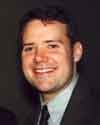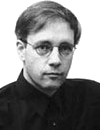Contemporary American Chamber Music
Clapp Recital Hall, Thursday, December 4, 2003, 8:00 pm
Program
| Chasing Feldman | John ALLEMEIER | |
| Alla Cross, violin Charletta Taylor, viola David Evenchick, violoncello Marcelina Turcanu, piano Michael Masengarb, percussion |
||
| Hommage a W. A. (William Albright) | David GOMPPER | |
| David Gompper, piano | ||
| Crossed | David GOMPPER | |
| Kenneth Tse (faculty), saxophone Alla Cross, violin David Gompper, piano |
||
| Pir-Ondine | Ketty NEZ | |
| Bruno Faria, flute Christine Bellomy, clarinet Alla Cross, violin David Evenchick, violoncello Ketty Nez, piano Michael Massengarb, percussion |
Notes & Bios
John Allemeier
Chasing Feldman

As an American composer living in Europe, I am constantly confronted with the legacy of Morton Feldman. European composers and musicians consider Morton Feldman to be one of the most important figures in American music in the 20th Century. Ironically, his music is virtually unknown to many educated musicians in the United States.
The original "Chasing Feldman" is for violin and piano. It was composed as a reaction to my experiences at the Internationalen Ferienkurse fuer Neue Musik in Darmstadt, Germany (International Summer Courses for New Music). The impact of Feldman's music has resulted in many young European composers imitating his style and ideas. In Darmstadt, there were endless concerts of meditative music that wondered aimlessly through time. Sometime during the 18th concert of slow quiet music, all I could think was "if I could only get my hands on Morton Feldman right now." "Chasing Feldman" is a tribute to Morton Feldman that sounds like my music, not his.
Approximately six months after I finished "Chasing Feldman," I decided to return to some of the same ideas to create a chamber piece, "Chasing Feldman (Revisited)." While composing the original piece, there was a slow section with the violin playing only natural harmonics. This section was left out of the original, but plays a major role in the chamber piece. The only material the two pieces share is the contrapuntal fast music
John M. Allemeier received his Ph.D. in Composition from the University of Iowa, his Master of Music in Composition from Northwestern University and his Bachelor of Music in Performance from Augustana College. At the University of Iowa, Mr. Allemeier received the Henry and Parker Peltzer Fellowship Award for Excellence in Composition. He has studied composition with David K. Gompper, D. Martin Jenni, M. William Karlins and Michael Pisaro. Mr. Allemeier has studied in Europe at the 41st Internationalen Ferienkurse fuer Neue Musik in Darmstadt, Germany and the 6th International Composition Course in Cesky Krumlov, Czech Republic. Mr. Allemeier's music has been programmed on such international venues as Russia-America: Music of the XXI Century - Moscow Conservatory, the Seoul International Computer Music Festival and the 7th Brazilian Symposium on Computer Music, on national conferences of the Society of Composers and the Society for Electro Acoustic Music in the United States, and at regional conferences of the College Music Society and the Society of Composers. His music has been recognized by the Ibla Foundation European International Competition for Composers and the American Society of Composers, Authors and Publishers with honorable mention in the ASCAP Foundation/Rudolf Nissim Composers Competition and ASCAP Standard Awards. He has received supporting grants from Marshall University and the University of Iowa Fine Arts Council. Mr. Allemeier's music is published by Carl Fischer Music Publishers, C. Alan Publications, M. Baker Publications and European American Music. He has taught at Marshall University and the University of Iowa and currently lives in Wiesbaden, Germany.
David Gompper
Hommage a W. A. (William Albright)
This piano work was written in homage to my teacher, William Albright, who died prematurely on 17 September 1998. He and William Bolcom were among those who, in the 1960s and 70s, initiated and supported the revival of ragtime music in this country. He was also a first rate organist and pianist, and a dedicated composer.
All of the musical material was generated from the last letters of his name.

While the work is in three main sections, the middle contains my dream of the type of rag Albright was fond of composing and performing.
Crossed
Crossed is closedly related to a composition written last summer entitled Crossings, scored for violin, saxophone quartet and piano and written for the Viennese Saxophone Quartet. Both pieces use the same harmonic structure--a seven-pitch set based on the initials of each of the current performers in that quartet. While this new work borrows from the central section of the earlier composition, its approach is entirely different, and completely new material was created from the same set of 7-notes, which are distributed in a 3x4 matrix. Hence, the idea of crossing from one set to another, based on a modulation scheme made up of two sets of tritones (G-C-sharp; D-A-flat). Voice crossing, imitative techniques and a "cross-fertilization" of timbres was an attempt to join together the wildly disparate sonorities between the three instruments. The work is in one movement, formally divided into three sections: slow, fast, slow.

David Gompper (b. 1954), who grew up in New York and San Diego, lived in London (where he studied with Jeremy Dale Roberts, Humphrey Searle and Phyllis Sellick at the Royal College of Music), Nigeria, Michigan, Texas and is currently Professor of Composition and Director of the Center for New Music at the University of Iowa. This past year he lived in Moscow as a Fulbright Scholar, teaching, performing and conducting at the Moscow Conservatory.
Gompper is active as a pianist and composer. Recently, he has worked with the Austrian violinist Wolfgang David (Sengstschmid) on a CD recording of contemporary American music, and has performed with him in Moscow, the U.S. and Vienna. Gompper's compositions are heard throughout the U.S. and Europe. His Transitus was premiered at Carnegie Hall in 1992, and has recently premiered his compositions at the Wigmore Hall in London: Hommage a W. A. (William Albright) in October 2001 and Shades of Love, a song cycle on the poetry of C. Cavafy this past September. He is currently completing a violin concerto--its first movement was performed last April at the Moscow Conservatory. Gompper just returned from Moscow, where Crossed was performed at the festival Moscow Autumn sponored by the Union of Composers.
Ketty Nez
Pir-Ondine
The composition Pir-Ondine was written during my move to Amsterdam from San Francisco in 1996 and thus mirrors my own personal and musical journey. Pirin is an area in Bulgaria in which Macedonians live, close to where my family comes from. Several of their songs are used to create layers by means of extensive melodic deconstructions - "decontextualizations" - as well as by abstractions of accompanying rhythms. Occasionally the surface of a slow-moving "chaconne" can be discerned.

Composer/pianist Ketty Nez just completed a residence of several months at the Ecole Nationale de Musique in Montbeliard, France, where she worked with faculty and students on projects of live electronics and improvisation. Her chamber opera An Opera in Devolution: Drama in 540 Seconds was premiered this year at the 7th Festival A*Devantgarde in Munich, and new projects include commissions from the Groupe de Recherches Musicales (GRM) and the Kientzy-Portuondo Meta Duo.
In 2001, as visiting composer at Stanford University's Center for Computer Research in Music and Acoustics (CCRMA), she produced a concert for flute and electronics, which included the premiere of Unseen Similarities. She worked for two years with Louis Andriessen in Amsterdam, and also co-founded a composers' collective.
Her music has been played at festivals in the US as well as abroad, including Bulgaria, England, Finland, France, Germany, Holland, and Japan. She spent the year 1988 in Japan, studying with Michio Mamiya and writing for traditional Japanese instruments. She has participated as fellow in the Aspen Music Festival (in 2001, 1991, and 1989), the 1998 June in Buffalo Festival, the 1997 Britten-Pears School Composition Course (Aldeburgh, England), the 1996 California State University Summer Arts Composition Workshop, the 1995 Tanglewood Music Center, and the 1990 Pacific Composers Conference (in Sapporo, Japan).
After completing her doctorate in composition at the University of California at Berkeley in 1994, she taught for two years at San Francisco State University. While in the Bay Area, she co-founded two new music ensembles, the Brodo/Nez cello-piano duo and the Composers' Coalition. She also performed as pianist with the groups Earplay and Composers, Inc. She holds a master's degree in composition from the Eastman School of Music, a bachelor's degree in piano performance from the Curtis Institute of Music, and a bachelor's degree in psychology from Bryn Mawr College. Currently she is a Visiting Assistant Professor at the University of Iowa School of Music.